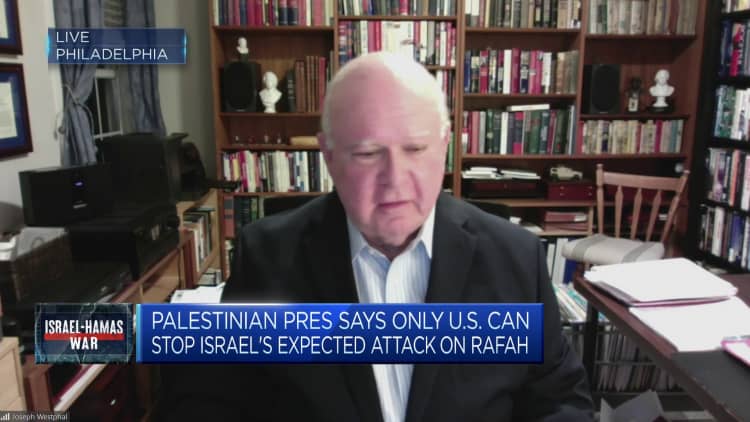The International Court of Justice displayed on a smartphone, with the flag of Israel visible in the background in Brussels, Belgium, on May 20, 2024.
Nurphoto | Nurphoto | Getty Images
On Friday, the U.N.’s top court, the International Court of Justice, ordered Israel to cease its military offensive in Rafah in the south of the Gaza Strip, citing concerns over the safety of Palestinian civilians.
“Israel must immediately halt its military offensive and any other action in the Rafah governorate which may inflict on the Palestinian group in Gaza conditions of life that could bring about its physical destruction in whole or in part,” ICJ President Nawaf Salam said.
The court noted that conditions in Rafah had deteriorated further since the ICJ’s last ruling in March. The court also said the provisional measures that the ICJ, also known as the World Court, instructed at the time no longer cover current circumstances.
The court further found that evacuation and other measures undertaken by Israel in Rafah were not sufficient.
“Israel must take effective measures to ensure the unimpeded access to the Gaza Strip of any commission of inquiry, fact-finding mission or other investigative body mandated by competent order of the United Nations to investigate allegations of genocide,” the ruling said.
Israel defended itself after the court’s order.
“Israel is acting based on its right to defend its territory and its citizens, consistent with its moral values and in compliance with international law, including international humanitarian law,” said a joint statement from the head of the Israeli National Security Council and the spokesperson of the Israeli Ministry of Foreign Affairs.
“Israel has not and will not conduct military actions in the Rafah area which may inflict on the Palestinian civilian population in Gaza conditions of life that could bring about its physical destruction in whole or in part,” the statement added, stressing that Israel “continue its efforts to enable humanitarian assistance and will act, in full compliance with the law, to reduce as much as possible harm caused to the civilian population in Gaza.”
“Those who demand that the State of Israel stop the war, demand that it decree itself to cease to exist. We will not agree to that,” Israel’s Finance Minister Bezalel Smotrich said in a Google-translated update on social media platform X. “If we lay down our weapons, the enemy will reach the beds of our children and women throughout the land.”

Earlier this month, Israel advanced its military campaign into Rafah, where more than 1 million displaced Palestinian people have sought shelter.
South Africa called on the ICJ to rule on the Rafah offensive as part of a broader case initiated in December by the African nation that requested the Court’s pronouncement over potential genocide risks resulting from Israel’s broader military campaign in the Gaza Strip. The World Court has so far said that Israel must take steps to prevent genocide against civilians trapped in the besieged enclave but has fallen short of mandating a ceasefire.
Israel maintains that its objectives in the Gaza Strip are not to target civilians but to eliminate Palestinian militant group Hamas, which claimed over 1,200 lives in the Oct. 7 terror attack in Israel, according to official figures. The ensuing Israel-Hamas war has killed more than 35,000 people in Gaza, according to Palestinian health authorities there.
Hamas welcomed the World Court ruling, calling on the U.N. to intercede with pressure on Israel to comply with the pronouncement.
“We expected the International Court of Justice to issue a decision to stop the aggression and genocide against our people in the entire Gaza Strip,” the Palestinian militant group said in a Google-translated statement. “And not only in Rafah governorate, what is happening in Jabalia and other governorates of the Gaza Strip is no less criminal and dangerous than what is happening in Rafah.”
The Palestinian Authority, which controlled the Gaza Strip before a complete takeover by Hamas, likewise hailed the ICJ decision and said it represents an international consensus to end the war in the enclave, Palestinian presidential spokesman Nabil Abu Rudeineh told Reuters.

The ICJ issues rulings that are final and without appeal. However, the court cannot directly enforce these rulings. Its pronouncements nevertheless deal heavy reputational blows and risk deepening Israel’s international isolation, amid growing concerns abroad over the proportionality of its response to the Gaza conflict.
Developments in Rafah have stoked tensions between Israel and close ally Washington, with Israeli Prime Minister Benjamin Netanyahu acknowledging a “disagreement” with the U.S. on the merits of the offensive while standing firm on its importance to national security.
“But we have to do what we have to do,” Netanyahu said in an interview with CNBC’s Sara Eisen last week. “Sometimes you have to … you just have to do what is required to ensure your survival and your future. We cannot continue into the future by having Hamas retake Gaza.”
The World Court ruling is the third diplomatic blow to Israel this week.
On Monday, International Court Prosecutor Karim Khan applied for arrest warrants for Netanyahu and Israeli Defense Minister Yoav Gallant in connection with alleged crimes committed throughout Israel’s campaign in the broader Gaza Strip.
In the same filing, the prosecutor pursued arrest warrants for Yahya Sinwar, Hamas leader; Ismail Haniyeh, the group’s political bureau chief; and Mohammed Diab Ibrahim al-Masri, the commander in chief of Hamas’ military wing, the al-Qassam brigade. The three are sought in connection with alleged crimes committed during Hamas’ Oct. 7 terror attack against Israel, including murder, the taking of hostages and sexual abuse. Both Israel and Hamas have criticized the ICC application for arrest warrants, which still pends review.
Later in the week, Norway, Ireland and Spain said they would recognize an independent Palestinian state, according to the three countries’ prime ministers.
